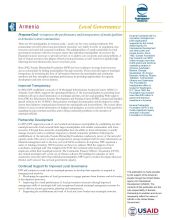Program Goal – to improve the performance and transparency of municipalities in rural communities.
There are 925 municipalities in Armenia today – nearly one for every existing settlement. The communities served by these local government structures vary widely in terms of population, size, resources and social and economic conditions. The administration of small communities by local government structures with few resources means that individual municipalities do not have the financial resources necessary to provide services or to address core economic and social problems. A lack of human resources also plagues effective local governance, as staff turnover is typically high following the local elections that occur every three years.
Since 2002, Eurasia Partnership Foundation (EPF) has been working to leverage local resources across communities by linking municipalities through networks. These networks improve municipal transparency by increasing the flow of information between the municipality and community members and they strengthen municipal performance by providing opportunities for capacity development and joint service delivery.
Improved Transparency
In 2002, EPF established a network of 10 Municipal Informational Analytical Centers (MIAC) in Armenia. Each MIAC supports the operating efficiency of the local municipality by providing local residents with up-to-date information on municipal activities, services and spending. With support from EPF, the Information Systems Development and Training Center (ISTDC) created and installed special software in the 10 MIACs that generates municipal documentation and developed an online system that facilitates communication between the municipality and local residents. The system allows citizens to access current information on budgets and programs, to receive answers to their questions regarding local government activities, and to bring community problems to the attention of municipal officials.
Partnership Development
In 2005, EPF supported a total of one hundred and nineteen municipalities by establishing ten inter-municipal networks. Each network links larger municipalities with smaller communities with fewer resources. Through these networks, municipalities have the ability to share information, to jointly manage resources and to coordinate responses to shared community problems. Following the establishment of the networks, Eurasia Partnership Foundation conducted a survey of the networks’ capacity needs. This survey revealed a strong interest among municipal staff for more information on financial management and on the Law on Local Self-Government. In response, EPF organized a series of training-of-trainers (TOT) sessions on these two subjects. With the support of local consultants, municipal staff that completed the TOT then retrained other local government employees within their municipal network. The Community Finance Officers’ Association (CFOA) also trained municipal staff on the use of finance software. By building the capacities of inter-community networks rather than individual municipalities, EPF hopes to reduce the impact that post-election staff turnover has on local government capacity.
Continued Support for Improved LG
EPF will continue to work with its municipal partners to develop their capacities to respond to emerging local needs by:
- Developing the capacities of local government to engage partners from business and civil society in development processes;
- Improving the overall performance of local government structures through improved management skills of municipal staff and strengthened internal municipal management systems for service delivery, income generation, planning and transparency;
- Supporting the establishment and work of local and cross-border inter-municipal networks.
Related documents
Since 2002, Eurasia Partnership Foundation (EPF) has been working to leverage local resources across communities by linking municipalities through networks.

